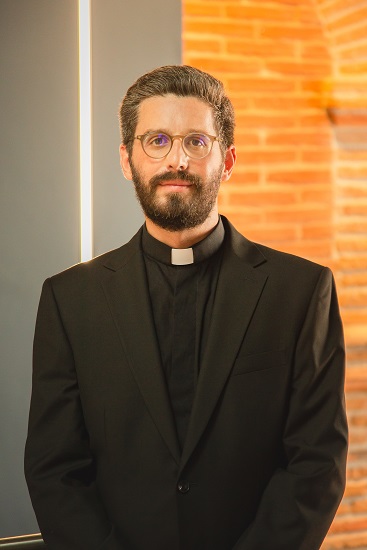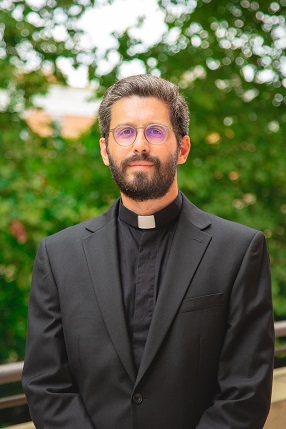
Grégory Woimbée appointed Rector of UCLy
Professor Grégory WOIMBÉE, born in 1976, Doctor of History and Theology, has been appointed the new Rector of UCLy. He will take up his post on July 1, 2024. He succeeds Olivier ARTUS, who has held this position since 2019.
News of the school Press releases
updated on 23 May 2024
UCLy
A new rector at UCLy for a 5-year term (2024/2029)
At 48, Grégory Woimbée becomes one of the youngest rectors in UCLy's history (1). Experienced in research and committed to the internationalization of Catholic universities, he brings with him a wealth of experience and a vision that matches UCLy's values. "Students are one of our society's most precious assets: they are the natural embodiment of its future. We need to help them take their full share of responsibility and action," explains Grégory Woimbée.
To prepare UCLy for new challenges, he intends to pursue the reforms resolutely pursued by Olivier Artus: "consolidate what has been developed, develop what has been consolidated ", declares the future Rector. "I intend to involve all UCLy stakeholders in the development of a strategic plan. We need to conquer the future together, with a sense of the long term and with courage ".
Grégory Woimbée's career has been marked by his extensive knowledge of higher education issues, first as Vice-Rector for Research and International Relations at the Institut Catholique de Toulouse, then as Director of Doctoral Studies at the Faculty of Theology of the Institut Catholique de Paris (ICP).
His appointment followed a rigorous selection process, involving UCLy employees, its Board of Directors, representatives of the AFPICL (Association des Fondateurs et Protecteurs de l'Institut Catholique de Lyon) and, in particular, UCLy's founding bishops and the Archbishop of Lyon, our Chancellor Mgr Olivier de Germay.
UCLy expresses its deep gratitude to Olivier Artus for his five years of dedication as Rector. Under his leadership, our institution has consolidated and developed to reach a new academic and institutional dimension within Lyon's academic world.
Grégory Woimbée : "Excellence through empathy"
The new Rector arrives in Lyon with a clear vision: to emphasize UCLy's values of academic excellence, rigorous research and community involvement, while focusing on internationalizing the University and cultivating "excellence through empathy" (2). "The University is first and foremost a community, made up of like-minded people pursuing the same goal".
Grégory Woimbée has devoted a large part of his career to the Institut Catholique de Toulouse, where he climbed the academic ladder from Lecturer to Professor, and finally Vice-Rector for Research and International Relations from 2014 to 2022. "My experience in Toulouse has enabled me to understand the importance of research and international collaboration. I am convinced that these elements are essential for the development of our University", he explains.
In addition to his academic achievements, Grégory Woimbée has also demonstrated a profound pastoral commitment: "it taught me the value of listening and service, qualities that I intend to integrate into my mission at the Université Catholique de Lyon."
His conviction that empathy is a prerequisite for governance has been dear to UCLy since its creation nearly 150 years ago. To prefer this approach to competition and selection is to create a University where everyone can succeed and find their place, by valuing collective strength. "The person and his or her dignity are at the heart of Catholic education," explains Grégory Woimbée, "both as an obligation that we place on ourselves in the way we do things, but also as a heritage that we make it our duty to pass on."
A dual academic and theological training
Grégory Woimbée was born on May1, 1976 in Saint-Mihiel, in the Meuse region of Lorraine, in France. His academic and professional career illustrates his dedication to education and the Church.
After completing preparatory classes in hypokhâgne and khâgne at the Lycée Henri IV in Paris, he went on to study canon law at the Institut Catholique de Toulouse, obtaining his Master’s degree in 2005. In 2006, he obtained a Doctorate in History from the Université Paris-IV Sorbonne. He also completed a post-doctorate at Boston College’s Lonergan Institute from 2006 to 2007. The same year, he obtained a second Doctorate, this time in Theology at the Pontifical Gregorian University in Rome.
Ordained to the priesthood on June 2004 for the Diocese of Perpignan, Grégory Woimbée has spent his entire career combining religious and academic commitments. From 2009 to 2015, he was Rector-Archbishop of the Basilique-Cathédrale Saint-Jean de Perpignan and parish priest of Perpignan’s downtown parishes, bearing witness to his pastoral dedication.
At the same time, he joined the Institut Catholique de Toulouse in 2007. Over the years, he has held a number of academic positions, first as a lecturer, then as assistant professor, lecturer and finally Professor in 2014. That same year, he became ICT’s Vice-Rector for Research and International Relations, a position he held until 2022. During this period, he contributed to the institute’s international reputation.
In 2022, Grégory Woimbée was appointed Director of the Theologicum doctoral program at the Institut Catholique de Paris, where he continues to share his knowledge and experience with a new generation of researchers, historians and theologians.
He is the author of some fifty publications in dogmatic and fundamental theology.

(1) Two rectors took on this responsibility before the age of 40, including Father Pierre Dadolle (1894-1906) and Father Pierre Gardette, Rector of UCLy for 19 years from 1945 to 1964.
(2) In his letter of candidacy for the post of Rector of UCLy, Father Gregory Woimbée clarified his thoughts on this notion of "excellence through empathy". "It seems at first glance a contradictory expression, because our world aspires to excel through selection and competition, by eliminating the weakest, the least useful. This maxim is a powerful message: it says that we can all succeed, all find our own way, our place in society and for the service of society (...) and that we are only strong collectively, the weakest among us. Empathy is not a word, it is a method or an instrument of governance (...). Empathy or mercy is not a goal, but a path on which excellence remains the goal (...)."
